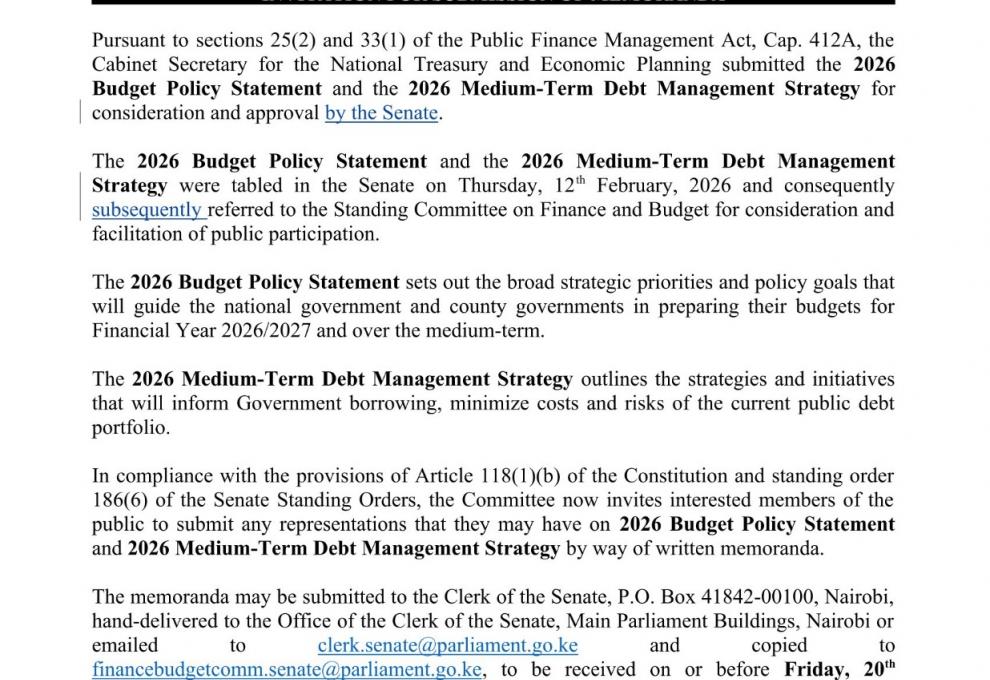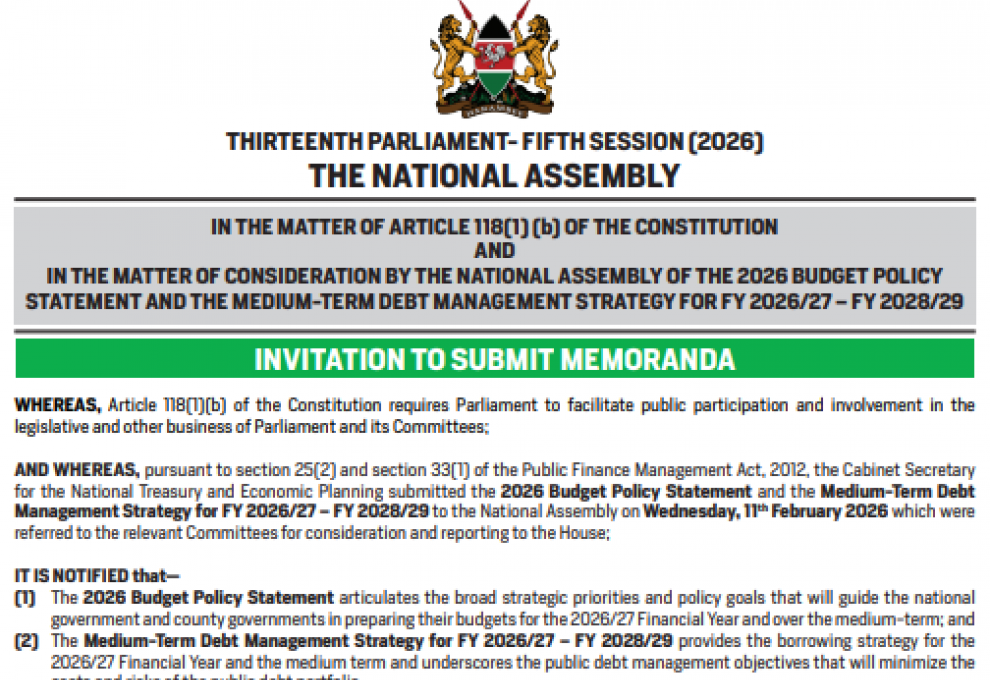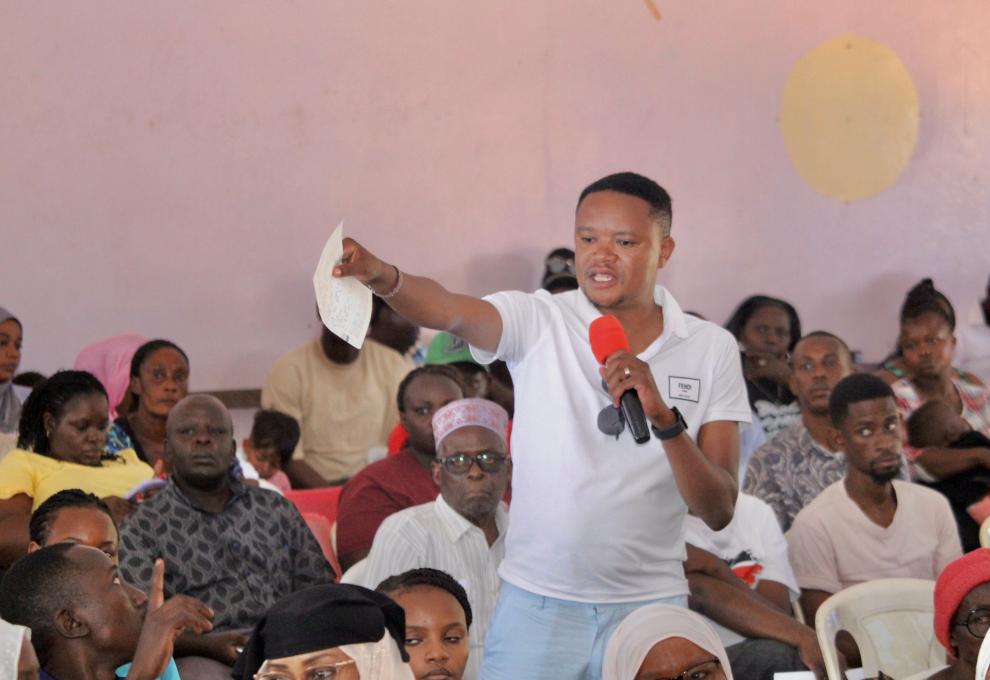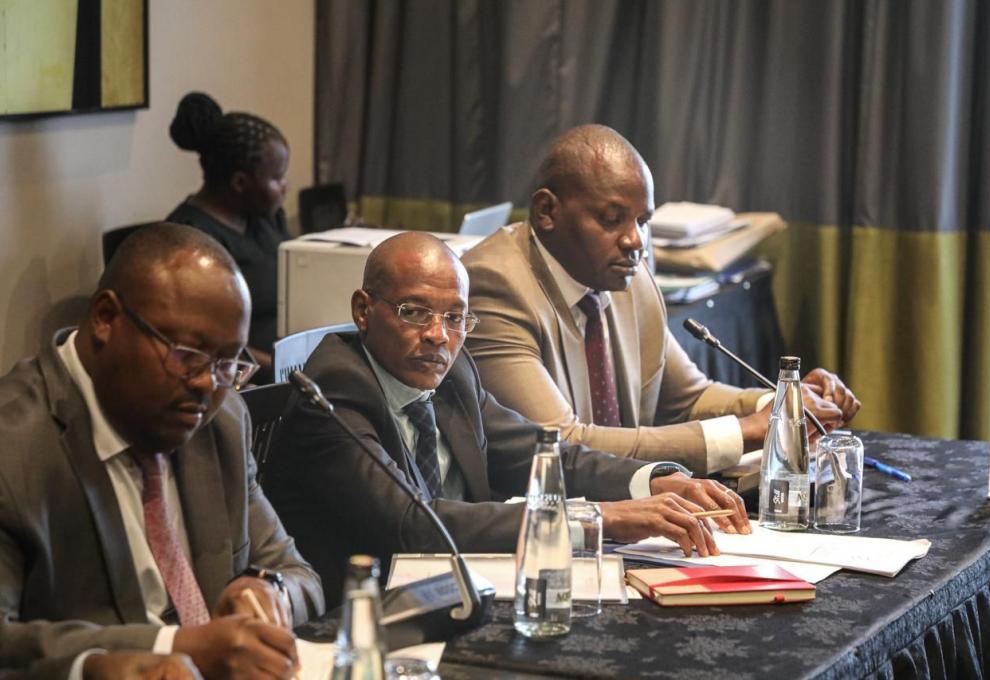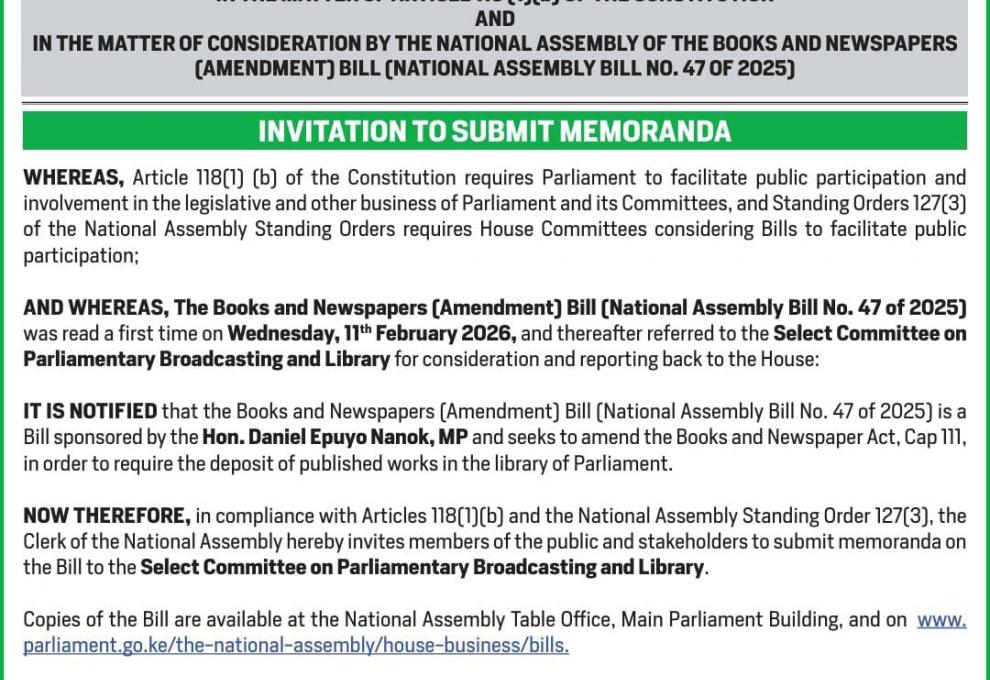Glossary of Terms
- Act: (of Parliament) is a law made by parliament; a bill that has passed all three Readings in each House and has received the Presidential assent.
- Appropriation bill: A bill which if passed by parliament, will allow the government to spend money it has gathered from the community through taxes and charges, on Government, services, roads, dams, schools, etc.
- Assent: to agree or to approve. E.g. the President assents to bills after the house has passed them.
- Attorney General: the principal legal advisor to the Government, nominated and appointed by the President with the approval of the national Assembly
- Aye: the word used for voting ‘yes’ in Parliament.
- Back-bencher: A Member of Parliament who is not a Minister or shadow Minister.
- Bar: A barrier at the main entrance to the Legislative Assembly chambers.
- Bicameral: having two chambers or houses especially of a law-making body i.e. it has an upper and lower house.
- Bill: a proposal for a new law, which has been presented to parliament.
- Bipartisan: Representing, having or supported by two major parties.
- Budget: it is an organizational plan stated in monetary terms. It can also be defined as a financial plan and a list of all planned expenses and revenues. It is also a plan for saving, borrowing and spending;
- Budget policy paper: policy statement containing- an assessment of the current financial year and the projected state of the economy for the next three years; the macro economic and fiscal policies for the period specified above; targets for total overall revenues including domestic and external borrowing and aggregate expenditure; and the total resources to be allocated to the individual programmes and projects within a sector or ministry for the period specified indicating the outputs expected from each such programme or project during the period. It also details the criteria used to allocate or apportion the available public resources among the various programmes and projects;
- Budget Office: the technical secretariat composed of competent professionals in the service of parliamentarians to analyze fiscal and monetary policies and issues, in the course of budgetary process
- By-election: A special election held to fill the seat of a member of the House of Assembly who has died or retired during a life of the Parliament.
- Cabinet: The group of Ministers in a government. In Kenya, this will comprise of the President, Deputy President, the Attorney General and a minimum of 14 and a maximum of 22 Cabinet Secretaries
- Cabinet Secretary – a Minister or head of Department appointed by the President, with the approval of the National Assembly to be responsible for a Department/Ministry.
- Casting vote: A vote that decides the matter when votes are equally divided.
- Chamber: The debating /meeting room of a House of Parliament.
- Clerk: the senior most permanent officer (equivalent of a permanent secretary) of the legislature who advises the speaker on procedural and administrative matters. In Kenya the clerk is the accounting officer and head of parliamentary service staff and secretary to the Parliamentary Service Commission
- Committee: a Parliamentary Committee means a representative Committee which is a microcosm of the main House, which is appointed or elected by the House or nominated by the Speaker and which works under the direction of the Speaker and presents its report to the House or to the Speaker. There are several types of committees: Watchdog; Departmental (portfolio), Housekeeping and Adhoc committees
- Conscience vote: A vote in Parliament in which members are free to vote according to their own judgments or beliefs, and not necessarily according to the guidelines, policies or decisions of their political.
- Constituency: the electorate or area, or the people in it, which a member of parliament represents.
- Constituent: someone who votes, or lives, in an electorate or area, which a member of parliament represents.
- Constitution: A constitution is a set of fundamental values, principles or established precedents according to which a state or other entity is governed. These rules together make up, i.e. constitute, what the entity is. When these principles are written down into a single collection or set of legal documents, those documents may be said to comprise a written constitution. Kenya promulgated a new constitution on August 27, 2010 after a referenda vote.
- Cross bench: one of a set of seats usually for Members of Parliament who belong to neither the Government nor the opposition parties; seats for minor parties and independents
- Cross the floor: to vote with an opposing party
- Debate: A discussion in which the arguments for and against a subject are presented according to specific rules (Standing Orders)
- Dissolve the House: to bring to an end the life of the House of Assembly and make a new election necessary, upon conclusion of its stipulated term, which expires on the date of the next general election;
- Division 1 - the separation of the members of the House into two groups, for and against, so the votes can be counted and recorded in Hansard.
- 2 - One of the parts that a country or state is divided into for the purpose of holding an election
- Estimates Committee: Committees which meet during each year to look at Government spending proposals set by the Budget Documents. This task is now done by the Fiscal Analysis and Appropriations Committee
- Filibuster: the use of long speeches or other tactics in Parliament to delay deliberately a vote or decision
- Franchise (universal): a citizen’s right to vote at elections
- Gag: procedure for closing a discussion in a house when some Members still wish to speak.
- Gallery: - (Press) a gallery reserved for the press
- Gallery - (Public) an area in a house of Parliament set aside for the public
- Gerrymander: the drawing of the boundaries of electorates in a way which gives one political group an unfair advantage in elections by maximizing its potential vote
- Government backbencher: a Member of Parliament who belongs to the governing party or parties, but who is not a minister
- Hansard: the full reports (verbatim) of the speeches of Members of Parliament; the printed record of the debates in Parliament
- Honourable: the terms "Honourable” "Honourable Member for... ", "Honourable colleague" and others are titles used by and on Members of Parliament in their respective chambers as a courtesy, where traditionally they are not allowed to call each other by name
- Independent (Member): a Member of Parliament who does not belong to a political party (currently not provided for in Kenya).
- Interjection: a remark made to interrupt, or respond to a point during a speech or conversation.
- Joint Committee: a Committee made up of Members of at least two Committees or in bicameral parliaments; both Houses of Parliament
- Landslide: an easy win in an election
- Leader of the Opposition: the leader of the party who has the biggest majority after the Government party and is made up of members who do not support the Government.
- Legislation: a law or a set of laws and/or the making of laws
- Leave of the House: implies a situation where there is no objection of any Member for the House to decide or make a resolution on a matter before it
- Lobby: a group of people trying to get support for a particular cause or to approach people for support
- Mace: once a weapon of war, shaped like a club, and the symbol of authority of House of Parliament and its Speaker.
- Maiden speech: the first speech in Parliament by a newly-elected member (often delivered uninterrupted)
- Mandate: the authority which is assumed by a party winning Government to have been given by voters for the party to implement policies which were the subject of an election campaign - a commission to act for another.
- Member of Parliament (MP): - a member of a house of Parliament, usually used to describe a Member of National Assembly.
- Minister (Cabinet Secretary) up to and until next general elections, a Member of Parliament) a member of the Executive Government, and who is usually in charge of a Government Ministry.
- Ministry (Departments) – functional units of the Executive Government created in accordance with Article 152 (1) (d); to administer various sectors of the state, and led by Cabinet Secretaries, who are formally appointed by the President with approval of National Assembly
- Noes: the votes of Members in a house who vote 'no'.
- Order Paper: the document issued each sitting day which lists all outstanding business before a house of Parliament
- Oath of allegiance: a declaration, using God's name, made by State officers including Members of Parliament in accordance with the Third schedule, stating that they will be loyal and faithful to the people, constitution and the republic of Kenya
- Offices of Parliament: refers to the respective offices of the Speakers and Deputy Speakers in each of the House. Others are the Leader of the Majority Party, and the Leader of the Minority Party in the National Assembly
- Opening speech: a speech by the President, in which the reasons for the calling together of Parliament are given, the affairs of the state are reviewed and the Government’s plans for new laws are outlined
- Opposition backbencher: a Member of Parliament who belongs to the opposition party, but who is not a Shadow Minister
- Parliament: in Kenya, comprise of the National Assembly and the Senate mandated to perform their respective functions to make laws for the country;
- Parliamentary Legal Counsel: an office of legal officers who draft or prepare proposals for new laws or amendments to existing laws
- Party leaders
Leader of majority party –is the person who is the leader in the National Assembly of the largest party or coalition of parties;
Leader of minority party – is the person who is the leader in the national Assembly of the second largest party or coalition of parties
- People's house: a name often used to refer to the House of Parliament
- Petition: a document presented to a house of Parliament by a person or group of people asking for action on a matter; a formal request; especially to a person or a group in power.
- Plebiscite: a vote by all voters on a question; a referendum; a vote by members of a party to decide on a candidate or select a delegate
- Point of order: a question as to whether proceedings in a meeting are in accord with the rules or in the correct form.
- Policy: a definite course of action adopted and pursued by the government with reference to prudence or expediency to achieve certain set goals or objectives
- Public policy: Public policy is a purposive and consistent course of action produced and pursued by the government as a response to a perceived problem of a sector, constituency, formulated by a specific political process, and adopted, implemented, and enforced by a public agency.
- Precincts of Parliament: Buildings accommodating Members, the Chamber, and the rooms reserved for committee meetings. As "privilege" recognizes the right of the House to regulate its own affairs, the parliamentary precincts are outside the jurisdiction of local or provincial regulatory control
- Principal Secretary: a person appointed by the President with the approval of the National Assembly to be in charge of a Ministry (Department)
- President: The Head of State and Government. In some countries, it refers to the presiding officer or Speaker in the upper House
- Presiding officer:/Speaker a person elected in accordance with standing orders to preside over, or be in charge of, the business proceedings and administration of a House of Parliament.
- Proclamation: an official public announcement
- Prorogue: (the parliament) to end a session of Parliament and so discontinue meetings of the houses until the next session without an election intervening.
- Question by Private Notice: a written question listed on the Notice Paper asked of a Minister which is answered in writing within 72 hours (two sitting days)
- Question (Ordinary): question asked orally of a Cabinet Secretary (Minister) where the Minister usually has to respond within ten days.
- Reading: (of a bill): formal stages (first, second and third) in the passage of a bill through Parliament
- Recess: refers to legislative bodies that are released to reassemble at a later time. The members may leave the assembly venue or precincts but are expected to return back soon or remain nearby. A recess may be simply to allow a break or it may be related to the meeting (e.g. to allow time for vote-counting) or other matters within the legislative calendar
- Safe seat: an electorate in which the support for a member or party is such that the member or representative of that party is very likely to be elected.
- Second Reading (of a bill): the second stage of the passage of a bill through a house at which time discussion on the principle or purpose of the bill takes place.
- Select Committee: a group of Members from either house or both houses, appointed to inquire into and report on a particular subject. An Adhoc select committee has a definite lifespan, (mostly 90 days or three months) and in most cases ceases to exist when it has made its final report to the House.
- Serjeant-at Arms: Parliamentary officials responsible for security matters concerning the House; the Serjeant, whilst in the Chamber overseeing proceedings, can also escort MPs out of the chamber or parliamentary precincts by order of the Speaker. The post dates back to 1415 in the United Kingdom (UK) and was traditionally held by retired military or police figures.
- Session: One of the fundamental time periods into which a Parliament is divided, usually consisting of a number of separate sittings within a calendar year. Until 2010, when the Constitution of Kenya was promulgated, Sessions traditionally used to begin by a Speech from the President as Head of State and usually ended by prorogation or dissolution of the House.
- Sessional Committees: these are committees whose membership and tenure equivalent to a year or a session. Membership and tenure is renewed every year.
- Shadow Minister: a member of the shadow ministry. Shadow ministers 'shadow' or follow closely, the areas of responsibility and activities of Ministers
- Shadow Ministry: the members of the main opposition party or parties in a Parliament who are party spokespersons in areas which usually match the areas of responsibility of Ministers in the Government;
- Sitting: A meeting of the House within a session; Although usually a calendar day, a sitting may last for only a matter of minutes or may extend over several days.
- Speaker or presiding officer (for each House of parliament): the person who is elected by that House in accordance with standing orders from among persons who are qualified to be elected as members of parliament but are not such members. He is often its spokesperson.
- Standing orders: the permanent rules which govern the conduct of business in a House of Parliament
- Standing Committees: portfolio committees equivalent to Departmental aligned function whose membership tenure is normally the life of a legislature, normally five years;
- Statutory authority: a Government agency set up by an Act of Parliament, more or less independent of day to day ministerial control, usually not bound by public service procedures to the same extent as ordinary departments but which is responsible finally to Parliament.
- Suffrage: the right to vote at elections
- Swinging voter: a person who transfers his or her support (vote) from one political party to another at different elections
- Term of Parliament: 1) the term of each House of parliament expires on the date of the next general election; 2) term of parliament may be extended by a resolution of at least two thirds of members in each House, from time to time but not by more than six months at a time, and certainly not more than a total of twelve months
- Third Reading: (of a bill) the final stage in the passage of a bill through a House of Parliament
- Un-parliamentary language: words used in a House which the presiding officer judges to be offensive or disorderly, and which is usually required to be withdrawn
- Westminster: (1) the Houses of Parliament in London. (2) The city of Westminster in London where the Houses of Parliament are located.
- Westminster system: system of Government originating in Britain, the main features of which are a head of state who is not the head of Government and an executive which is drawn from and which is directly responsible to the Parliament (the Parliament is supreme)
100. Whip: a party manager in Parliament who is responsible for organizing Members of his or her party to take part in debates and votes, and who assists in arranging the business of a house of Parliament.
Frequently Asked Questions
What is a Bill?
A Bill is a draft law introduced in Parliament for debate. The person in whose name a Bill is proposed is referred to as the sponsor of the Bill.
What is a legislative proposal?
A legislative proposal is an idea for a Bill.
Where does the idea of a Bill come from?
The legislative proposal or idea for a Bill can come from several sources: Senators, Committees of the Senate, the Executive, professional organizations, lobbyists or individuals. While the idea for a Bill may come from any person, a Bill must have a Sponsor in order to be introduced in the Senate. The sponsor can either be a Senator or a Committee of the Senate.
What happens after an idea for a Bill is formed?
The Sponsor of a Bill submits the idea for a Bill to the Speaker. This may be done by filling out an instruction note indicating briefly the idea of the Bill and making reference to any useful resources. The Speaker then refers the legislative proposal to the Clerk for drafting by the Directorate of Legal Services.
What is a public Bill?
A public Bill is a Bill which proposes a law of general application throughout the jurisdiction in which it is proposed to be passed.
What is a private Bill?
A private Bill is a Bill designed to provide a benefit or exemption to an individual or group from the application of the law, such as a Bill to exempt a certain class of individuals from paying tax.
What is a special Bill?
A special Bill, under the Constitution, is a Bill that affects the functions of a county government and which relates to the election of members of a county assembly or a county executive or is the annual County Allocation of Revenue Bill.
What is an ordinary Bill?
An ordinary Bill is a Bill which is neither a Money Bill nor a special Bill.
What is a money Bill?
A Money Bill is a Bill that contains provisions dealing with taxes; the imposition of charges on a public fund or the variation or repeal of any of those charges; the appropriation, receipt, custody, investment or issue of public money; the raising or guaranteeing of any loan or its repayment. A Money Bill can only be introduced in the National Assembly.
What is the Directorate of Legal Services?
The Directorate of Legal Services is the directorate in the Senate whose core mandate is to draft Bills on the instructions of and in consultation with a Senator. Once a legislative proposal has been submitted to the Directorate, a Legal Counsel in the Directorate will be assigned to draft the Bill and to ensure that it conforms to the Constitution, existing law and the drafting style of the Senate.
What happens after a draft Bill is developed?
The draft Bill, duly signed by the Sponsor is forwarded by the Clerk to the Speaker (with comments on whether it affects or does not affect counties, is a money Bill and conforms to the Constitution and to the Law as to format and style). Where the Sponsor of the Bill is a Senator, the Speaker refers the draft Bill to the relevant Committee for pre-publication scrutiny and comments. The Committee is required to submit its comments to the Speaker within fourteen days of receipt of the draft Bill. After receiving comments on the Bill from the relevant committee, the Speaker may certify that the draft Bill is ready for publication, in which case the Directorate of Legal Services then forwards the Bill to the Government printer for publication.
Who publishes Bills?
Bills are published by the Government Printer in the Kenya Gazette and assigned a number in order of transmission to the Government Printer for publishing. Bills introduced in the Senate are blue in color while those introduced in the National Assembly are green. Once a Bill has been published, the Clerk avails a copy for each Senator.
What happens after a Bill is published?
After publication and before First Reading of a Bill, the Speaker of the Senate seeks the agreement of the Speaker of the National Assembly on whether the Bill concerns Counties and if it does, whether it is a special or ordinary Bill.
So, when is the Bill introduced in the Senate?
A Bill is introduced in the Senate after fourteen days of publication. The Division of Revenue Bill and the County Allocation of Revenue Bills, however, are introduced after seven days of publication.
How does a Bill become law?
In order for a Bill to become a law, it must go through a number of stages in both the Senate and the National Assembly. These stages as set out below are similar in both Houses-
What is First Reading?
This occurs when a Bill is introduced in Parliament. A Bill is read a first time by the Clerk reading only the title of the Bill.
What is Committal to the relevant Committee and public participation?
After the First Reading, the Bill is automatically referred to the relevant standing committee. The committee is required to facilitate public participation and to take into account the views of the public when it makes its report to the Senate. The committee is required to submit its report to the Senate within thirty 30 calendar days. The Committee carries out public participation, obtains the views of the members of the public on the Bill and prepares a report within the period specified above. The Committee then tables the report before the House.
What is Second Reading?
During this stage, the Senators debate the essence and principles of the Bill and give their views on the Bill.
What is Committee of the Whole?
This is a Committee composed of all Senators in plenary. At Committee, the Senate considers the Bill clause by clause and may amend the clauses. Any Senator, other than the sponsor of the Bill, who wishes to move an amendment to the Bill, must give written notification of the amendment to the Clerk at least twenty four (24) hours before commencement of the sitting at which the amendment is to be considered.
What is Third Reading?
Once Committee of the whole on a Bill is concluded, the Bill is reported back to the Senate. On adoption of the report on the Bill, the Bill is read a third time. No amendments maybe moved at this stage except amending the motion to defer or postpone the third reading of the Bill to a future date.
What is Concurrence of the National Assembly?
A Bill that is passed by the Senate must be submitted to the National Assembly. A certified copy of the Bill is forwarded to the Clerk of the National Assembly together with a Message signed by the Speaker requesting concurrence of the Assembly. If the National Assembly agrees with the Bill and does not propose any amendments, the Senate forwards the Bill to the President for assent.
If the National Assembly proposes amendments to the Bill, the amendments are submitted to the Senate and are circulated to the Senators. The amendments are then considered in the Committee of the Whole. The Senate may then pass the Bill by including all the amendments or may reject any or all the amendments. Where an amendment is rejected, the Bill is referred to a mediation committee.
What is a Mediation Committee?
Whenever the Senate does not agree to any of the amendments proposed by the National Assembly or rejects a Motion that a Bill which originated in the National Assembly be read a second or third time, the Speakers of both Houses appoint a Mediation Committee, consisting of an equal number of Senators and Members of the National Assembly to develop a version of the Bill that is agreeable to both Houses.
What happens if the mediation committee fails to agree on a Bill?
If within thirty (30) days the mediation Committee fails to agree on a version of the Bill, the Bill will be deemed to be lost. If the Committee agrees on a version that is passed by both Houses, the Bill is passed.
What is Presidential Assent?
Once a Bill originating in the Senate has been passed by both Houses, the Speaker refers the concluded Bill to the President for assent. The President is required within fourteen (14) days to either assent to the Bill or refer the Bill back to the Senate for reconsideration noting any reservations by the President.
What happens when a Bill is referred back to Parliament by the President?
Parliament may either amend the Bill in light of the President’s reservations or pass it a second time without amendments or with amendments that do not fully accommodate the President’s reservations.
What is Publication of the law?
Once a Bill has been assented to, the Bill is published as an Act of Parliament within seven days after assent. An Act of Parliament comes into force on the fourteenth day after its publication in the Gazette unless the Act provides for a different date or time.











